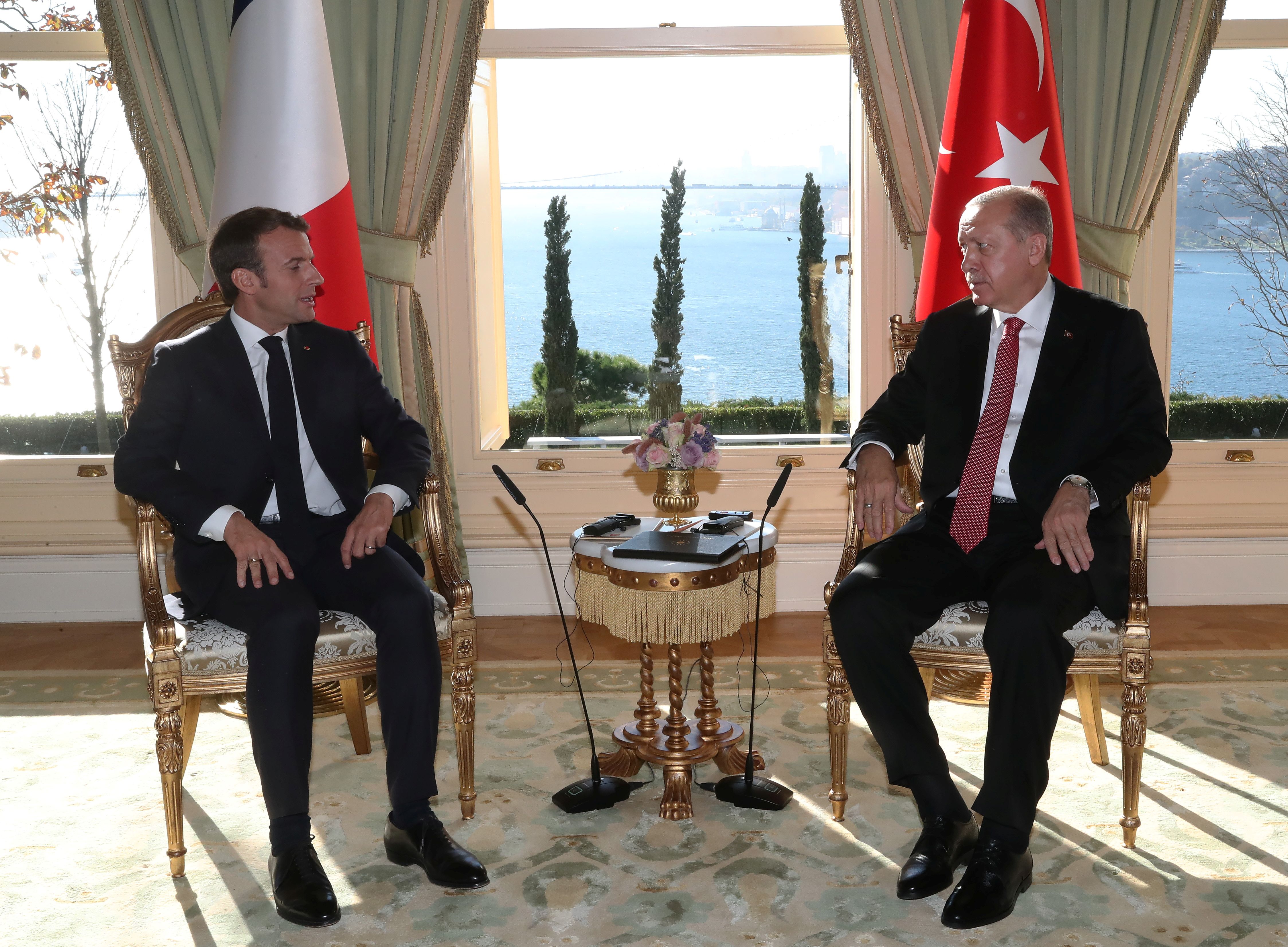The Franco-Turkish Tensions

Franco-Turkish tensions around Libya have been intensifying since January. Then, Turkey, which supports Fayez al-Sarraj’s Government of National Accord (GNA) in the Libyan civil war, sent soldiers and pro-Turkish militias from Syria to train local troops in Libya and fight on the GNA’s side. The Turks also have been delivering weapons to their allies in breach of a UN Security Council embargo and the decisions of a peace conference held in Berlin on 19 January. These actions were sharply criticised by French President Emmanuel Macron as France supports the GNA’s adversary, the Libyan National Army (LNA) led by Gen. Khalifa Haftar. The tensions escalated on 10 June when the crew of French Navy ship Courbet, taking part in the NATO Sea Guardian operation, wanted to inspect a ship suspected of transporting weapons to Libya. The French claim the Courbet was blocked by Turkish ships escorting the suspect ship. Turkey denied the French accusations and on 18 June, NATO decided to investigate the case. France subsequently suspended its participation in the Sea Guardian mission, maintaining simultaneously its engagement in the EU operation IRINI (launched in the end of March to enforce the UN arms embargo concerning Libya). France also called for a special EU Council for Foreign Affairs meeting entirely dedicated to Turkey; it is set for 13 July.
France’s View
France aims to reinforce its influence in the Mediterranean, vital to its economic and security interests. Jihadist groups are considered the most serious threat in the area. In this context, the French authorities decided to cooperate in Syria with the People’s Protection Units (YPG), perceived by Turkeys as terrorists, in fighting the so-called Islamic State (ISIS) and in Libya with Gen. Haftar, hoping that with a quick victory over the GNA, the country would re-stabilise. France also considers the GNA to be influenced by the Muslim Brotherhood (MB), perceived as an instrument of Turkish policy in the region. France’s stance on Libya is also conditioned by its close relationship with other GNA adversaries—the United Arab Emirates, Saudi Arabia, and Egypt. All these countries fight the MB, fearing its popularity in Arab societies could undermine their regimes, but for France it is the group’s role as weapons purchaser that remains crucial.
Another important factor is France’s interest in the East Med Gas Forum (EMGF), aiming to enhance the extraction and transport of resources from the Eastern Mediterranean to Europe. In January, France requested membership in the EMGF and French gas-oil champion Total wants to participate in extraction. This is another point of contention with Turkey, which opposes these regional energy projects, arguing that their purpose is to exclude Turkey from cooperation and profits.
France’s rivalry with Turkey in the Mediterranean is one of the reasons why France is pushing for a strategic dialogue with Russia. France argues that it can prevent Russia from making a deal with Turkey on a division of influence in Syria and Libya. Such a deal could leave territories crucial to Europe’s security under Russian and Turkish control, increasing the two countries’ potential for pressure on Europe. The French authorities consider Turkey a more important strategic challenge than Russia because the former undermines NATO cohesion from inside, blackmails the EU with mass-migration, and destabilises the domestic security of European countries with the large Turkish diaspora. In 2019, French diplomacy tried, unsuccessfully, to persuade the U.S. to its side. It indicated that cooperation with Turkey in Libya is pointless, predicting an imminent division of influence between Turkey and Russia.
Turkey’s View
Turkey’s involvement in Libya is key to its policy in the Eastern Mediterranean. An agreement on maritime jurisdiction, signed with the GNA, seeks to block regional energy projects Turkey deems harmful and help it resolve delimitation disputes in a favourable way. These aims also will be served by strengthening Turkey’s position in the Mediterranean Basin thanks to the construction of two military bases in Libya, one for land forces and the second an air base. Turkey is also motivated by economic benefits from the involvement of Turkish companies in the future reconstruction of Libya.
The Turkish authorities support the MB-related forces in the region because of their ideological affinity, which they believe could improve their country’s position in the Middle East. In addition, they claim that only politicians associated with MB are able to gain the democratic legitimacy of local societies. In this context, the disagreements with France, which the Turks criticize for supporting Haftar, are used in Turkish foreign and internal policy. They allow politicians to present the state as an anti-imperialist force that aims for the good of the region’s societies, not their own interests. This narrative is especially to the liking of the conservative-nationalist electorate in Turkey.
Yet, the dispute with France also has deeper meaning for Turkey—it is a part of its quest for higher status within NATO. The Turks claim their security interests are not respected on an equal footing with those of other big members, as evidenced by the French and American cooperation with the YPG and NATO’s subsequent refusal to recognise it as a terrorist organisation. Turkey’s efforts in the past six months to present itself to the U.S. as an actor capable of taking care of American interests in the region also serve this purpose, as demonstrated by President Recep Tayyip Erdoğan’s conversation with U.S. President Donald Trump in June. After the call, the Turkish leader announced there were unspecified agreements with the U.S. on Libya and the arrival of a “new era” in Turkey-U.S. relations.
Conclusions
The Franco-Turkish dispute goes beyond the Libyan context as a result of differences in threat perception and ways to eliminate them. Therefore, it will have a negative impact on NATO and Turkish-European relations, even if there is a breakthrough in the Libyan conflict, as suggested by France’s more visible attempts since the start of June to distance itself from Haftar.
France’s worries over Turkey are justified. By bolstering its position in Libya, the country will gain further instruments of pressure on the EU, and its policy in recent years—for example, migration blackmail—suggests the Turks will be prone to using them. However, balancing Turkey with Russia as France suggests is not a preferable solution to the EU as it may reinforce Russia’s influence in the Mediterranean. A much better solution would be to strengthen the UN-led Libyan peace process. The end of French support for Haftar would increase the chances of success of the peace process and strengthen the EU’s position in Libya towards Turkey.
The Franco-Turkish dispute weakens NATO cohesion, which is detrimental to Poland, as evidenced by Turkey’s blocking of the allied plans for Poland and the Baltic States. The dispute—and lack of allies supporting France’s position—also has prompted Macron to intensify his criticism of NATO and voice the need for building European strategic autonomy.
France’s stance on Libya has had a negative impact on the coherence of EU policy towards the conflict. Yet, imposing sanctions on Turkey for its actions in Libya, as proposed by France, would only deepen the differences between the Member States. A better solution would be strengthening the IRINI operation—Poland could emphasize its support for the stabilisation of Libya by more active participation in it—and signifying the need to respect the UN embargo by all parties. Sealing the border between Egypt and Libya could be a real step towards ensuring this.
The Franco-Turkish tensions are also an offshoot of U.S. policy. Its uncoordinated withdrawal from the Middle East and disagreements with allies regarding threats on the Southern Flank have spurred conflict within the Alliance. The mediation of a new U.S. administration after the November elections, supplemented by a discussion on the security of the southern flank, could bring the positions of France and Turkey closer.



